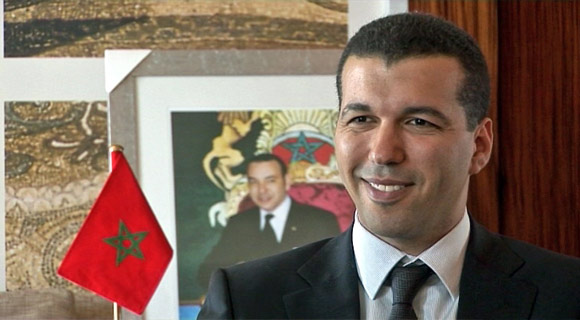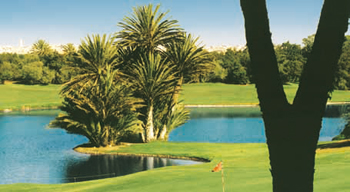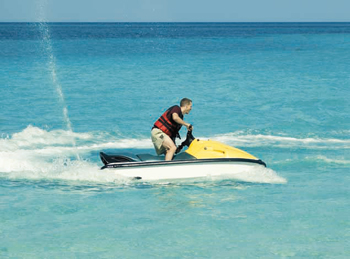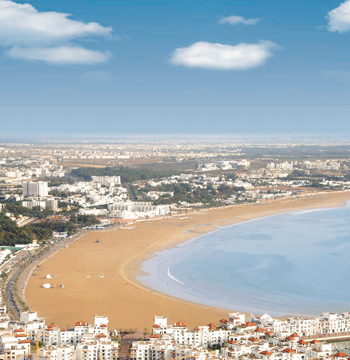Moroccan Agency for Tourism Development
Tarik Senhaji Chairman of Moroccan Agency for Tourism Development
We’ve surveyed 1450 sites and out of these only 350 are exploited, meaning there is massive untapped potential in Morocco to do business.
Interview with Tarik Senhaji Chairman of Moroccan Agency for Tourism Development

In the view of the regional events, what are your actions to communicate the message of Moroccan exception, and to calm the investors who are looking at the region with uncertainty?
For certain the recent events have brought heightened interest in the region, but we view it as an opportunity to communicate on our model, to communicate all the good things that are happening in our sector, and to show how resilient and interesting an investment
we’ve surveyed 1450 sites and out of these only 350 are exploited, meaning there is massive untapped potential in Morocco to do business.
opportunity in Morocco is. If you look at the recent past, Morocco has been doing very well. It had preformed remarkably well in 2009 for example. As you may know 2009 had seen negative growth in a lot of tourism destinations around the Mediterranean, but Morocco had +6% during that year. In 2010 we are again on a positive trend with +11% and this is something we are carrying into the new quarter of 2011 with a progression of double digits. We feel there is a very good product in Morocco and that investors will see that.
You meet with the investors on a daily basis, what is their response to Morocco? Are they aware that Morocco is different from other countries?
An investment in tourism is an interesting proposition because it is a long term investment. You have to trust in a story over the long term, and we believe in Morocco. We have identified some key goal drivers that we have worked on for a number of years and are paying dividends. And because of that we have a very good response from investors because they realize that the dynamic of Morocco is very specific and it’s very interesting.
As someone coming from a background in finance from London, how is this going to affect the maintenance of your strategy and overall vision?
In the current context, actions speak louder than words. We have a lot of new projects coming into Morocco and we will be announcing a number of new deals, and I think that is the best message. Regarding SMIT, as you know SMIT has a responsibility for engineering of new touristic products in the Moroccan territory, and also  accompanying investors in their quest to deliver good performance. In that sense, having someone who speaks their language is appreciated. There is the technical expertise which is there and it is very good, but also having the financial engineering in order to have a good product is very important to them.
accompanying investors in their quest to deliver good performance. In that sense, having someone who speaks their language is appreciated. There is the technical expertise which is there and it is very good, but also having the financial engineering in order to have a good product is very important to them.
The slogan for the Moroccan Agency of Tourism is “Come and Earn Money with Us” and the philosophy is “We Want to Make Partnerships Win-Win”. Can you elaborate on this statement and give us some of the specific examples that make money in Morocco?
Let me start by saying that tourism is the second contributor to our national GDP with a share of 8%. It employs 450,000 people directly and many more indirectly. It is also a very important vector for us to develop remote regions, and it is also a very important factor in the development of our infrastructure. We feel it is our duty, with all the benefits it brings to our country, to help investors from an early stage, to give them resources and incentives in order to develop their project ideas. I would like to point out two different parameters; one is an attractive set of incentives, whether its taxes, land prices, or resources, in order to help them achieve their target, but we also have human resources such as SMIT and regional investment bureaus who are there to accompany them and speed up the red tape, if you wish, in order for them to be fully satisfied with what Morocco has to offer.
As for some of the specific examples?
There are exemptions, for example, on VAT for any goods that you are bringing into the country. There is, for large projects, an investment chart with the government, where the government is going to take chance of putting the infrastructure in place to bring in water, electricity, and they will be covered by the government rather than the investor. There are a number of other benefits, such as the premiums for investments. You can get a certain premium depending on the region you are going to invest in and the product you are going to invest in which are from 0-20%. So, that can be a very important upfront premium for your investment. We are here to build long term partnership with investors because as I said, investment in tourism is a long term project and it’s important to build a long term win-win relationship where, as you said, the investor is bringing a lot of benefits to our country, but he is also doing it in an economically valuable way for himself.
For instance, can you name one investment that came and made money and was successful with these private public partnerships?
For instance I saw you visited the Mazagan Beach Resort which is in Al Jadida. This is something that is very interesting because the investor came into a new destination and developed a new market for us, and on the other hand, he got quite a lot of support from the state in terms of acquiring the land and in terms of getting infrastructure in a remote site and getting tax incentives. For us it has created a lot of employment in the region, but it has also allowed the investor to have a new destination in Morocco which he can market worldwide.
What are the main obstacles to investing in the Moroccan tourism sector, and how are you going to help an investor?
Let me first say a word about the overall tourism sector in Morocco. We have a product which was viewed as a niche market a few years back and might have been seen as a hindrance, but now it is a massive advantage for us. Our tourism strategy is built on authenticity, culture, and respect for the environment. During the past five years we have had major positive dynamic within the sector and this is working towards our advantage because that is what today’s tourist is looking for. Essentially, this has allowed us to create a very good position for a product that has been helpful for our country and also very useful for investors. Regarding the obstacles, the ministry has put in place new strategy for the sector which is called “Vision 2020”. This is an integrated plan which not only talks about the objectives, because it is easy to have objectives, but it also talks about the resources and the means to do that. And within that there is an increased budget for promotion and training, a new school of excellence in partnership with some international resource centers and that’s going to be very positive as well in order to allow us to achieve our objectives.
You mentioned the vision. It is estimated that it will need an investment worth $20 Billion. Where is this money going to come from?
As you may know, here in Morocco we are in a dynamic of partnership between the public sector and the private sector. We believe that the private sector will come because it is an opportunity to have profitable projects. Within Vision 2020 we did an exercise which was to survey all the touristic sites within the territory today which can carry a project of a certain size and we’ve surveyed 1450 sites and out of these only 350 are exploited, meaning there is massive untapped potential in Morocco to do business. The second statistic, which is quite telling, is that the average spending per tourist in Morocco is 300 Euros higher than our competitors which again shows the premium image that Morocco has built and which can be further developed through additional investment. That’s what I think makes Morocco an interesting investment proposition. In addition to that, within Vision 2020 the Moroccan government is putting together financial resources in the form of a sovereign fund with the name of MFDT (Moroccan Fund for Development of Tourism) which has an envelope of 1.5 billion Euros. And that fund’s objective is to partner with other strategic investors in order to boost investments within the country.
As a finance engineer, you probably know every investment carries a risk. What is the risk involved in investing in the tourism sector of Morocco?
We believe that there is very high growth within the tourism sector in Morocco because the positioning is interesting. You have a premium image and a very large untapped potential which can be converted into an interesting financial project. Essentially what we are saying here is that there is a risk, but the rewards compensate for the risk: in other words the risk-reward ratio is very interesting in Morocco.
What have you witnessed? Is there more or less interest from the investors in the view of the regional events? What is the development in the investments?
In general an investment in tourism is quite different than going and spending your holiday somewhere, because where you go to spend your holiday is something you can decide very quickly. Investing in a region for tourism is an important decision, because generally it takes you 10-15 years to reimburse your principal. It’s very important for you to make an assessment of a long-term plan. What we have seen today talking to professionals is they are saying “We know Morocco, we know the dynamics, we’ve been there, we’ve done our homework and we are very comfortable knowing that this is an investment proposition that is going to pay off.” Because of that, we have a number of projects which are coming to completion, and as I said before, Morocco was viewed as a niche market a few years back, but it’s not the case anymore. Now it’s viewed as a reference. All the international hotel operators are either operating in Morocco, or are in the process of building their presence here. That’s why I think we are well positioned to continue our progress in this sector.